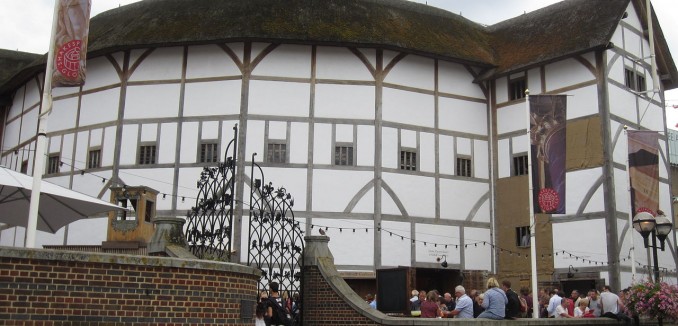First, the London Underground was littered with anti-Israel guerilla advertising. Then, David Cameron proclaimed in the House of Commons that he was “shocked” by the “encirclement of East Jerusalem” by Israeli settlements. Now, it looks as if Israel is to be passed over by Shakespeare’s Globe theatre company on its two-year, around-the-world tour of Hamlet.
On April 23, 2014—the 450th anniversary of William Shakespeare’s birth—Shakespeare’s Globe embarked on a simple yet daring project: to stage a sixteen-person production of Hamlet in every country in the world in just two years.
From Albania to Zimbabwe, director Dominic Dromgoole’s Hamlet is expected to grace 193 countries before April 23, 2016. “Globe to Globe Hamlet was created with the aim of performing Hamlet to as many people as possible, in as diverse a range of places as possible,” he has said. “The central principle of the tour is that Shakespeare can entertain and speak to anyone, no matter where they are on earth; and that no country or people are not better off for the lively presence of Hamlet.”
Yet Israel will not be graced with such liveliness and entertainment, it seems. The tour has but two months left to run, and a listing for a performance in Tel Aviv on February 29 that once appeared on their website has vanished into the online ether.
Troublingly, the travelling company has been in Israel’s neighborhood three times during the course of their tour without dropping in. In January of this year, Hamlet was staged in Egypt, Lebanon, Saudi Arabia, Kuwait, and Qatar. In November 2015, they performed it in Turkey, while in October they visited Jordan twice—including one performance at the Za’atari refugee camp—as well as the United Arab Emirates, Oman, and the Palestinian Territories. There are even plans to go to Iran before the end of April.
It is scarcely believable that, having arranged a visit to Ramallah to perform at the state-of-the-art Ramallah Cultural Palace—something that most probably would have had to have been cleared by Israeli authorities—they could not have travelled a few kilometers to stage Hamlet at Jerusalem’s Khan Theatre or any venue in Tel Aviv.
As logistical exercises go, arranging the staging of a modest production of Hamlet in Israel is far from nightmarish. It would be a darn sight easier to organize a five-hour flight to Ben-Gurion and a one-night-only performance at a Tel Aviv theater than, say, bringing about Hamlet in countries like Bhutan, Eritrea, Myanmar, Cambodia, Belize, or Palau—all nations Shakespeare’s Globe has managed to get to since April 2014. The security concerns that surround any visit to Israel cannot possibly be any greater than those that would exist in conflicts zones such as Somalia or refugee camps in Djibouti or Cameroon.
Indeed, Shakespeare’s Globe had to curtail their scheduled performance in the so-called “Jungle” refugee camp near Calais in France because the actors felt they could not continue for fear of their safety. Tom Bird, executive producer of Shakespeare’s Globe, told The Times of London that “people were trying to cut through to the backstage. There were a lot of knives around. That’s what really put me on edge. They were visible and out.”
It is unfortunate for Shakespeare’s Globe that they have a problematic history in terms of Israeli theatre. In May 2012, they played host to a company from the Habima—the national theatre of Israel—who performed The Merchant of Venice at the South Bank venue as part of a larger festival. Two months prior, a litany of thespians—including former Shakespeare’s Globe director Mark Rylance and multiple Oscar winner Emma Thompson—put their name to a letter denouncing Habima and their “shameful record of involvement with illegal Israeli settlements in Occupied Palestinian Territory.”
By inviting Habima, they wrote, “Shakespeare’s Globe is undermining the conscientious Israeli actors and playwrights who have refused to break international law.” The Globe, they concluded, “is associating itself with policies of exclusion practiced by the Israeli state and endorsed by its national theatre company. We ask the Globe to withdraw the invitation so that the festival is not complicit with human rights violations and the illegal colonization of occupied land.”
Pro-Palestinian activists, who never let a good opportunity to persecute Israelis go to waste, disrupted the performance of The Merchant of Venice on the night. They picketed the venue beforehand with leaflets that read, “Shakespeare says No to occupation and colonization.” During the show, around fifteen people were carried or led out of the theatre—including six who were physically picked up by their hands and feet by security after they began screaming and unfurling banners and Palestinian flags.
When we have spoken to Shakespeare’s Globe on two occasions this year, each time they have indicated that there is nothing unusual about the continued absence of Israel from their tour schedule. Spokespeople for the theatre have told us that they are still trying to arrange the staging of their production in Israel and the practicalities of any trip are still to be finalized. It might still be possible, Shakespeare’s Globe have told us, that Hamlet will be staged in Israel before April 23.
This might very well be true, but one might also suspect that Shakespeare’s Globe, having had one year and ten months and three trips to the Middle East during which they could have visited Israel, are quietly shunning Israel in order to avoid another row and confrontation with pro-Palestinian activists and anti-Israel voices on the British cultural scene. Let us hope that such fears are misplaced, and Israeli audiences get to see this globetrotting anniversary production of Hamlet by the time April is out.
Updated, 3/8: Shakespeare’s Globe has announced a performance in Tel Aviv on March 30.
Liam Hoare is a writer based in the United Kingdom. Tal Kra-Oz is a writer based in Tel Aviv.
[Photo: Another Believer / Wikimedia]




